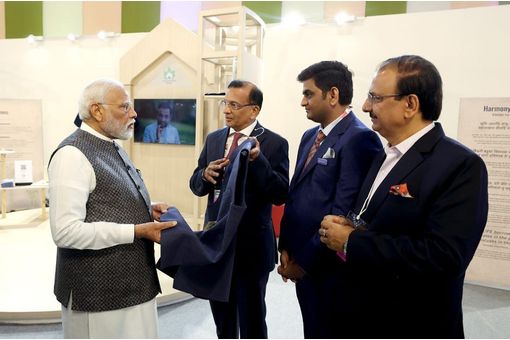Interviews
FICCI paints grave scenario in meeting with Cabinet Secretary
18 Dec '08
9 min read
Cotton Crisis Created by High MSPs:
Though there has been a huge decline in cotton prices in the international markets from October 2008 onwards, our domestic cotton prices are currently over 15 percent higher than international prices, because of the unreasonably high Minimum Support Prices announced by Government in September 2008. The result is that Indian mills find our cotton unaffordable and over 60 percent of the cotton arriving in the market is being procured by government agencies through MSP operations.
In the absence of a clear policy for disposing of the procured cotton, these agencies are sitting on huge stocks, creating an artificial scarcity in the cotton market. Unless the procured cotton is promptly sold to Indian mills at international prices, our mills will be forced either to buy domestic cotton at unaffordable prices or to import cotton. Both these options have serious adverse consequences both to our cotton economy and textile exports.
Measures taken by Government of India recently:
Government of India effected a steep reduction in Draw Back rates for textile products and withdrew the 4 percent subvention on export credit. Apparently these decisions were in the context of viewing the depreciation of Indian rupee against US dollar in isolation, without taking into account the other adverse developments in the domestic and international markets.
The Stimulus Package announced on 7th December 2008 by Government provides only for release of funds for TUFS and TED that had earlier been withheld by Government and for a partial reinstatement of interest subvention on packing credit that had earlier been withdrawn. Refund of service taxes envisaged in the Package will have a marginal positive impact on the textile industry, whereas the 4 percent reduction of Excise Duty will only have the adverse impact of increasing unutilized CENVAT Credit with the industry.
Measures Required to Revive Growth in the Sector:
The following are the urgent measures required immediately for arresting the negative trends in our production and exports of textiles products and the consequent loss of jobs:
•Allow liberal rescheduling of term loans taken by textiles and clothing industry by permitting deferment of 8 quarterly installments of principal amounts. Without such a rescheduling, most of the loans run the risk of turning into NPAs, creating serious problems for both the industry and the banking sector. The period for repayment of TUFS loans has to be extended from the current 10 years to 12 years, in order to accommodate the rescheduling.
•Restore the Drawback rates that prevailed before the reduction effected in September 2008 and also refund State level duties of 4-6 percent, which are currently not refunded by either Central Government or State Government. Since textile industry is not in the CENVAT route, refund its accumulated CENVAT credit in cash, as is currently done to exporters.
Though there has been a huge decline in cotton prices in the international markets from October 2008 onwards, our domestic cotton prices are currently over 15 percent higher than international prices, because of the unreasonably high Minimum Support Prices announced by Government in September 2008. The result is that Indian mills find our cotton unaffordable and over 60 percent of the cotton arriving in the market is being procured by government agencies through MSP operations.
In the absence of a clear policy for disposing of the procured cotton, these agencies are sitting on huge stocks, creating an artificial scarcity in the cotton market. Unless the procured cotton is promptly sold to Indian mills at international prices, our mills will be forced either to buy domestic cotton at unaffordable prices or to import cotton. Both these options have serious adverse consequences both to our cotton economy and textile exports.
Measures taken by Government of India recently:
Government of India effected a steep reduction in Draw Back rates for textile products and withdrew the 4 percent subvention on export credit. Apparently these decisions were in the context of viewing the depreciation of Indian rupee against US dollar in isolation, without taking into account the other adverse developments in the domestic and international markets.
The Stimulus Package announced on 7th December 2008 by Government provides only for release of funds for TUFS and TED that had earlier been withheld by Government and for a partial reinstatement of interest subvention on packing credit that had earlier been withdrawn. Refund of service taxes envisaged in the Package will have a marginal positive impact on the textile industry, whereas the 4 percent reduction of Excise Duty will only have the adverse impact of increasing unutilized CENVAT Credit with the industry.
Measures Required to Revive Growth in the Sector:
The following are the urgent measures required immediately for arresting the negative trends in our production and exports of textiles products and the consequent loss of jobs:
•Allow liberal rescheduling of term loans taken by textiles and clothing industry by permitting deferment of 8 quarterly installments of principal amounts. Without such a rescheduling, most of the loans run the risk of turning into NPAs, creating serious problems for both the industry and the banking sector. The period for repayment of TUFS loans has to be extended from the current 10 years to 12 years, in order to accommodate the rescheduling.
•Restore the Drawback rates that prevailed before the reduction effected in September 2008 and also refund State level duties of 4-6 percent, which are currently not refunded by either Central Government or State Government. Since textile industry is not in the CENVAT route, refund its accumulated CENVAT credit in cash, as is currently done to exporters.
Popular News
Leave your Comments
Editor’s Pick
































-Ltd..jpg?tr=w-120,h-60,c-at_max,cm-pad_resize,bg-ffffff)





.jpg?tr=w-120,h-60,c-at_max,cm-pad_resize,bg-ffffff)
.jpg?tr=w-120,h-60,c-at_max,cm-pad_resize,bg-ffffff)






